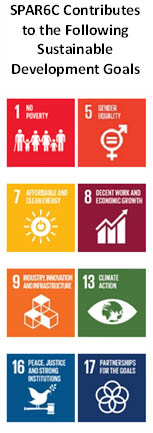The program selects four countries — Colombia, Pakistan, Thailand, and Zambia — each at different stages of institutional capacity, climate change mitigation strategy development, and NDC progress tracking.
Pakistan has joined the Supporting Preparedness for Article 6 Cooperation (SPAR6C) program. This puts Pakistan among the four countries which have been selected to develop this special program. The Ministry of Climate Change and Environmental Coordination officially launched a transformative project known as the Supporting Preparedness for Article 6 Cooperation, or SPAR6C. This ambitious five-year technical assistance program — generously supported by the German government — is poised to chart a new course for Pakistan’s environmental sustainability and climate resilience. SPAR6C brings together an international consortium of partners, spearheaded by the Global Green Growth Institute (GGGI) and bolstered by the expertise of the UNEP Copenhagen Climate Centre, GFA Consulting, Carbon Limits, and Kommunalkredit Public Consulting.
The launch of SPAR6C marks not only a significant milestone for Pakistan but also for international climate cooperation. At the heart of this program lies the Article 6 of the Paris Agreement, a framework that establishes a cooperative approach among countries to implement their Nationally Determined Contributions (NDCs). Under this framework, carbon market mechanisms have emerged as a powerful tool for achieving emissions reduction goals in a cost-effective manner. Carbon markets not only contribute to emissions reductions but also promote ambition raising in both mitigation and adaptation, engage the private sector, and foster sustainable development.
This growing recognition of the potential of carbon markets is reflected in the increasing interest from countries. As of July 2021, a remarkable 87% of new and updated NDCs mentioned voluntary cooperation under Article 6 as a means to achieve their goals.
The overarching objective of the SPAR6C program is to support four developing countries, including Pakistan, in building their capacity to use Article 6 cooperative approaches to engage the private sector in NDC implementation and ambition raising. This ambitious goal aims to create cost-efficient, flexible, high-integrity carbon markets with positive sustainability impacts.
The program selects four countries — Colombia, Pakistan, Thailand, and Zambia — each at different stages of institutional capacity, climate change mitigation strategy development, and NDC progress tracking. Despite these variations, all four nations share a common interest in utilizing cooperative approaches, yet they currently lack the skills and know-how to engage in Article 6 projects and access carbon finance to achieve their NDCs or increase their ambition.
The consortium partners, led by GGGI and including UNEP Copenhagen Climate Centre, GFA Consulting Group, Carbon Limits, and Kommunalkredit Public Consulting, have meticulously structured the SPAR6C program into six work packages. Each of the four target countries receives dedicated support, focusing on long-term planning, institutional readiness, and pilot project design. Additionally, two centrally managed packages are dedicated to the development of tools to implement cooperative mechanisms and the establishment of a Community of Practice as an international forum that brings together countries and practitioners interested in raising ambition through markets.
In the short term, SPAR6C’s vision is to stimulate climate mitigation activities and engage governments and the private sector in NDC implementation and ambition raising using Article 6 cooperative approaches. These endeavors are expected to have a substantial impact on the sustainable development strategies of the target countries, as the program generates co-benefits that extend beyond environmental goals.
For medium- and long-term, the program aims to create the necessary structures, procedures, and regulatory frameworks in partner countries. This will empower them to independently identify, structure, and implement climate programs with their own resources, ultimately strengthening their self-reliance and resilience.
In the context of Pakistan, the SPAR6C project emerges as a significant force in advancing key Sustainable Development Goals (SDGs). Foremost, it champions SDG 13 (Climate Action) by enhancing Pakistan’s capacity to participate in international carbon markets and promoting sustainable development through emissions reduction projects. Moreover, the program embodies the spirit of SDG 17 (Partnerships for the Goals) by fostering cooperation among the Pakistani government, private sector, academia, and international organizations in tackling climate change and establishing frameworks for environmental sustainability within the nation.

SPAR6C indirectly contributes to SDG 7 (Affordable and Clean Energy) by facilitating the transition to cleaner and more sustainable energy sources in Pakistan. Additionally, it plays a role in realizing SDG 11 (Sustainable Cities and Communities) by bolstering the nation’s capacity for sustainable development, ultimately contributing to the resilience and sustainability of cities and communities. The project aligns with SDG 9 (Industry, Innovation, and Infrastructure) by fostering innovation and collaboration in implementing climate projects and supporting the growth of sustainable infrastructure in Pakistan.
Through the engagement of the private sector and the facilitation of carbon market activities, SPAR6C supports SDG 8 (Decent Work and Economic Growth) in Pakistan, contributing to economic growth and generating opportunities for decent work in the context of sustainable development. While not its primary focus, the program’s efforts to reduce emissions and promote sustainable practices can have indirect, positive impacts on SDG 6 (Clean Water and Sanitation) by improving water resources and environmental quality within Pakistan. In essence, SPAR6C highlights the crucial role of climate action in Pakistan’s journey towards sustainable development, emphasizing the interconnectedness of these SDGs and their significance within the nation’s context.
The launch of the SPAR6C program is not just a significant step for Pakistan; it’s a critical milestone for global climate cooperation. It underscores the power of Article 6 as a mechanism to drive climate action and foster international collaboration. As Pakistan embarks on this journey, it sets an example for others, demonstrating that through dedication, knowledge sharing, and cooperation, we can collectively forge a greener, more sustainable future for our planet.



